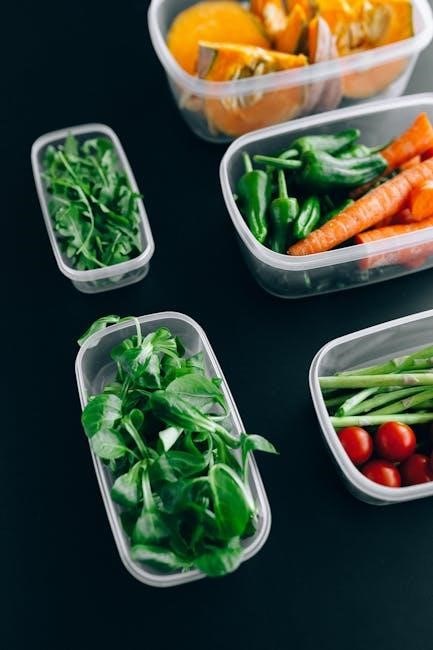This 4-week plan offers a structured approach to managing endometriosis through nutrition‚ focusing on anti-inflammatory foods‚ eliminating triggers‚ and optimizing symptoms. It emphasizes hydration and balanced eating for well-being.
Why Nutrition Matters in Managing Endometriosis
Nutrition plays a crucial role in managing endometriosis by reducing inflammation‚ a key driver of the condition. Certain foods can trigger inflammation‚ worsening symptoms like pain and bloating‚ while others‚ such as anti-inflammatory options‚ may help alleviate them. A well-balanced diet can improve overall well-being and quality of life. Studies suggest that dietary changes‚ such as increasing omega-3 intake and fiber consumption‚ may reduce severity and improve hormonal balance. A personalized approach to nutrition helps identify and avoid triggers‚ optimizing symptom relief. While diet isn’t a cure‚ it complements medical treatments‚ offering a proactive way to manage the condition and enhance long-term health outcomes.
Overview of the 4-Week Plan Structure
This 4-week endometriosis diet plan is designed to guide individuals through gradual‚ sustainable changes to their eating habits. Each week focuses on specific dietary goals‚ starting with foundational anti-inflammatory foods‚ then progressing to nutrient-dense options‚ symptom management‚ and long-term maintenance. The plan encourages the elimination of trigger foods‚ such as processed and high-inflammatory items‚ while emphasizing whole‚ nutrient-rich choices. By the end of the four weeks‚ participants are equipped with a comprehensive understanding of how to fuel their bodies for improved symptom relief and overall well-being. The structure is flexible‚ allowing for personalization to suit individual needs and preferences‚ ensuring a holistic approach to managing endometriosis through diet and lifestyle.

Week 1: Foundations of the Endometriosis Diet
Week 1 introduces anti-inflammatory foods‚ eliminates triggers‚ and emphasizes hydration and balanced eating to lay the groundwork for managing endometriosis symptoms effectively.
Understanding Anti-Inflammatory Foods
Anti-inflammatory foods play a crucial role in managing endometriosis by reducing inflammation and alleviating symptoms. Omega-3 rich foods like fatty fish‚ flaxseeds‚ and walnuts are key‚ as they help lower prostaglandins‚ which contribute to pain. Whole grains‚ fruits‚ and vegetables are also essential‚ offering antioxidants and fiber that combat inflammation. Leafy greens‚ berries‚ and citrus fruits are particularly beneficial due to their high vitamin and mineral content. Incorporating these foods helps reduce inflammation‚ which can ease pain and bloating associated with endometriosis. Avoiding pro-inflammatory foods like red meat‚ processed sugars‚ and refined carbohydrates further supports this approach. Balancing these choices aids in creating a diet that supports overall well-being and symptom relief.
Eliminating Trigger Foods
Identifying and eliminating trigger foods is a cornerstone of the 4-week endometriosis diet plan. Common triggers include gluten‚ dairy‚ processed sugars‚ and red meat‚ which can exacerbate inflammation and worsen symptoms. These foods often cause immune reactions‚ leading to increased pain and bloating. Refined carbohydrates‚ alcohol‚ and caffeine are also known to aggravate symptoms in some individuals. By removing these foods‚ the body can reduce inflammation and promote healing. It’s important to track how specific foods affect you and adjust your diet accordingly. Replacing triggers with whole‚ nutrient-dense foods helps create a balanced and supportive diet for managing endometriosis effectively.

Week 2: Incorporating Nutrient-Dense Foods
This phase introduces nutrient-dense foods like omega-3 rich fish‚ whole grains‚ and colorful vegetables to reduce inflammation and support healing. Fiber intake is also emphasized for digestion.

Focus on Omega-3 Rich Foods
Incorporating omega-3 rich foods like fatty fish (salmon‚ mackerel)‚ flaxseeds‚ and walnuts is crucial. Omega-3s reduce inflammation‚ a key factor in endometriosis‚ by inhibiting pro-inflammatory eicosanoids. Regular consumption may alleviate pain and improve symptoms. Aim for 2-3 servings of fatty fish weekly and add plant-based sources daily. These nutrients support overall health and can be combined with other anti-inflammatory foods for enhanced benefits. Consistency is key to experiencing noticeable improvements in both inflammation levels and symptom severity over time.
Increasing Fiber Intake
Increasing fiber intake is essential for gut health and inflammation reduction‚ both critical in managing endometriosis. Fiber-rich foods like whole grains‚ vegetables‚ and fruits help regulate digestion and reduce inflammation. A high-fiber diet promotes the growth of beneficial gut bacteria‚ improving overall well-being. Aim for 25-30 grams of fiber daily‚ including sources like brown rice‚ quinoa‚ leafy greens‚ and berries. Pairing fiber with omega-3s enhances anti-inflammatory effects. A balanced intake supports symptom relief and long-term health‚ making it a cornerstone of the 4-week plan. Consistency in fiber consumption aids in reducing bloating and pain‚ contributing to better quality of life for those with endometriosis.

Week 3: Managing Symptoms Through Diet
Week 3 focuses on managing endometriosis symptoms through dietary adjustments‚ emphasizing anti-inflammatory foods and strategies to reduce pain and inflammation while optimizing gut health for better comfort and well-being.
Dietary Strategies for Reducing Pain
Dietary strategies play a crucial role in reducing endometriosis-related pain. Incorporating omega-3 rich foods like fatty fish can help minimize inflammation‚ a key contributor to pain. Additionally‚ eliminating pro-inflammatory foods such as red meat and processed sugars can further alleviate discomfort. Staying hydrated is essential as it helps maintain hormonal balance and reduces bloating; Portion control and balanced meals can also prevent digestive discomfort‚ which often exacerbates pain. By focusing on whole‚ nutrient-dense foods and avoiding triggers‚ women can experience significant pain relief and improved overall well-being. These strategies are foundational to managing symptoms effectively throughout the 4-week plan.
Optimizing Gut Health
Optimizing gut health is essential for managing endometriosis‚ as it directly impacts inflammation and immune response. A diet rich in fiber from whole grains‚ fruits‚ and vegetables promotes a healthy gut microbiome‚ reducing inflammation. Probiotic-rich foods like yogurt and kefir can restore gut balance‚ while avoiding processed foods and added sugars helps prevent microbial imbalances. Staying hydrated is also crucial‚ as water aids digestion and prevents constipation. Incorporating omega-3 fatty acids further supports gut health by reducing inflammation. By prioritizing these strategies‚ women can improve digestion‚ reduce symptoms‚ and enhance overall well-being throughout the 4-week plan.

Week 4: Sustaining the Diet Long-Term

Week 4 focuses on maintaining the diet with meal prepping‚ balanced eating‚ and adapting choices to support long-term well-being and effectively manage symptoms and lifestyle adjustments.
Meal Prepping for Consistency
Meal prepping is essential for maintaining consistency in your endometriosis diet. By planning and preparing meals in advance‚ you can ensure healthy‚ anti-inflammatory choices throughout the week. Start by creating a weekly meal plan tailored to your needs‚ then shop for fresh‚ nutrient-dense ingredients. Portion out meals‚ snacks‚ and even smoothie ingredients to save time and reduce decision fatigue. This approach helps you avoid trigger foods and stay committed to your goals. Additionally‚ prepping allows for controlled portion sizes and balanced nutrition‚ making it easier to sustain the diet long-term. A well-organized meal prep routine fosters habits that support both symptom management and overall well-being.
Maintaining a Balanced Lifestyle
Maintaining a balanced lifestyle is crucial for managing endometriosis symptoms and supporting overall well-being. This includes staying hydrated‚ exercising regularly‚ and practicing stress management techniques. Incorporate activities like yoga or gentle walks to improve circulation and reduce pain. Prioritize sleep‚ aiming for 7-8 hours per night‚ as poor sleep can exacerbate inflammation. Additionally‚ limit alcohol and avoid smoking to support healing. Balancing nutrition with physical and mental well-being creates a holistic approach to managing endometriosis. By combining these habits with your diet plan‚ you can achieve long-term symptom relief and improved quality of life. Consistency and patience are key to sustaining these beneficial lifestyle changes.

Additional Tips for Success
Stay hydrated‚ avoid processed foods‚ and maintain consistency with your diet plan. Regular physical activity and stress management also support overall well-being and symptom relief effectively.
Importance of Hydration
Hydration is crucial for overall health‚ especially for women managing endometriosis. Drinking plenty of water helps flush toxins‚ reduce inflammation‚ and maintain hormonal balance. Aim for at least eight glasses daily‚ and consider incorporating herbal teas or electrolyte-rich beverages to replenish lost salts. Proper hydration can also aid in digestion and prevent bloating‚ common symptoms of endometriosis. Additionally‚ staying hydrated supports liver function‚ which plays a key role in hormone metabolism. By prioritizing hydration‚ you can enhance the effectiveness of your diet plan and improve your overall well-being throughout the four-week journey and beyond.
Reading Food Labels
Reading food labels is essential for making informed choices during your 4-week endometriosis diet. Look for products low in added sugars‚ unhealthy fats‚ and artificial additives‚ which can exacerbate inflammation. Choose items with whole food ingredients and avoid processed foods containing preservatives. Pay attention to portion sizes and calories to maintain a balanced intake. Be aware of hidden sources of gluten‚ dairy‚ and high FODMAP ingredients‚ which may trigger symptoms. Opting for organic‚ non-GMO options can further support your health goals. By becoming a vigilant label reader‚ you can avoid potential triggers and ensure your diet aligns with your endometriosis management plan‚ fostering better symptom control and overall well-being.




